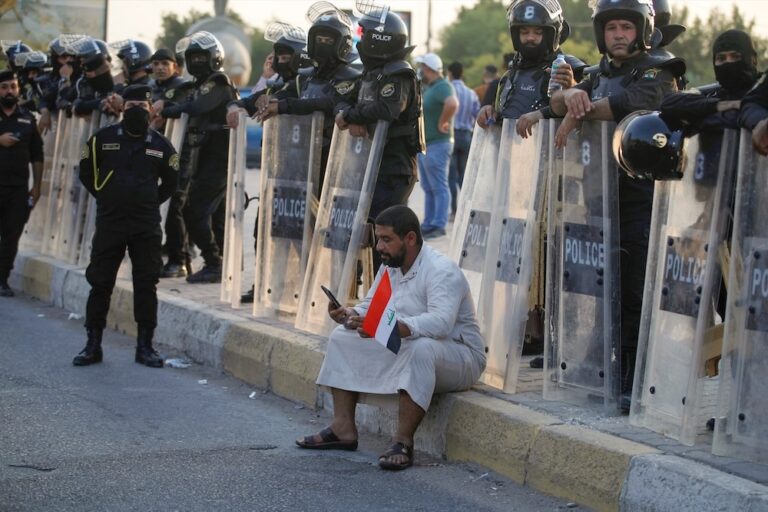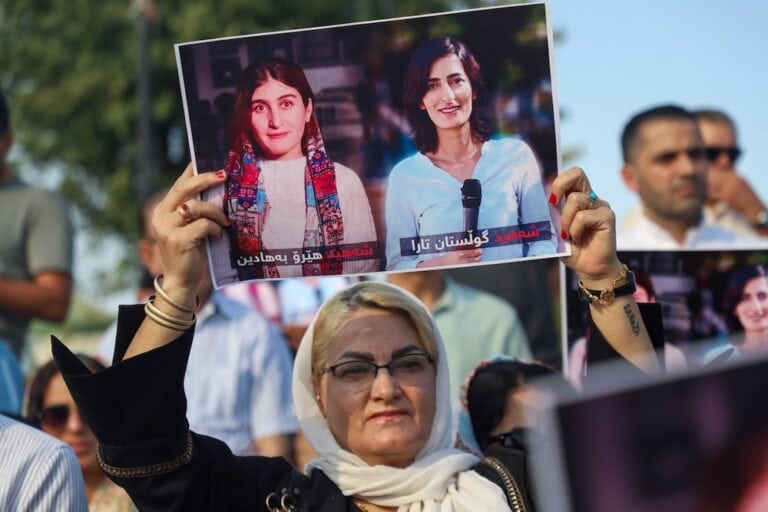(IFJ/IFEX) – The following is a 23 March 2003 IFJ media release. Please note that the IFJ has confirmed the death of reporter Terry Lloyd since the earlier distribution of this item. For further details, see previous IFEX alert of 24 March 2003: Media Death and Fears Over Missing Journalists Spark New IFJ War Plea […]
(IFJ/IFEX) – The following is a 23 March 2003 IFJ media release. Please note that the IFJ has confirmed the death of reporter Terry Lloyd since the earlier distribution of this item. For further details, see previous IFEX alert of 24 March 2003:
Media Death and Fears Over Missing Journalists Spark New IFJ War Plea
The International Federation of Journalists today called for the forces of the United States and its allies to protect all journalists and media staff covering the Iraq conflict – even those not formally travelling under military protection.
The death of Australian cameraman Paul Moran, who died in a reported suicide bombing in northern Iraq, and growing concern for the safety of a three-person television crew working for ITN, which is missing after reportedly being under fire while following forces moving on Basra, has raised new fears over the safety of journalists.
The IFJ is demanding that media exercise more restraint in covering the conflict. “Journalists, especially freelancers, are under tremendous pressure and they face terrible risks if they don’t keep their distance,” says the IFJ. “Safety is paramount and media organisations must not let their competitive urge to be first with the news get in the way of protecting people on the ground.”
“This is a war fought in the glare of world-wide publicity and everyone – military and media alike – must ensure that journalists and media staff are given protection,” said the IFJ.
“Journalists must be given protection by the military whether they are travelling under military control or not,” said Aidan White, General Secretary of the IFJ, this morning. “It is not acceptable to create a privileged group of so-called ’embedded’ journalists and to ignore the needs of other journalists from all around the world who are covering the conflict trying to serve many hundreds of millions of people who are hungry for news about the war.”
The IFJ President, Australian journalists’ leader Christopher Warren, expressed the shock and concern of journalists world-wide over the death of Paul Moran, a cameraman with the Australian Broadcasting Corporation, who died in a car bomb explosion in Sayed Sadiq, in Northern Iraq, outside the village of Khurmal yesterday.
“This death illustrates that in journalism there are tragic sacrifices to be made in covering the war in Iraq,” said Warren. “We send our most profound condolences to Paul’s family and colleagues. The whole region is potentially dangerous and all media must be alert to the threats.”
Witnesses said Moran and his two colleagues, who were injured, were waiting to enter the village when a taxi drew up beside them and exploded. Khurmal is a base of the mainstream Komala Islami Kurdistan (Islamic Society of Kurdistan), which was targeted by cruise missiles early Saturday at the same time as the hardline Ansar al-Islam, which is allegedly linked to the Al Qaeda terror network.
Meanwhile British television reporter Terry Lloyd and colleagues Fred Nerac and Hussein Othman are missing. ITN said the crew came under fire while travelling to Basra in southern Iraq. One of the crew, Daniel Demoustier, was injured but was able to get to safety. Lloyd is an award-winning correspondent who has reported extensively in the past from Cambodia, Bosnia and Kosovo.
The IFJ has also protested also over the expulsion of a CNN team from Baghdad. “This is a spiteful and petty act of victimisation against professional journalism by a regime that has no respect at all for press freedom,” said White.
The IFJ represents more than 500,000 journalists in more than 100 countries.


